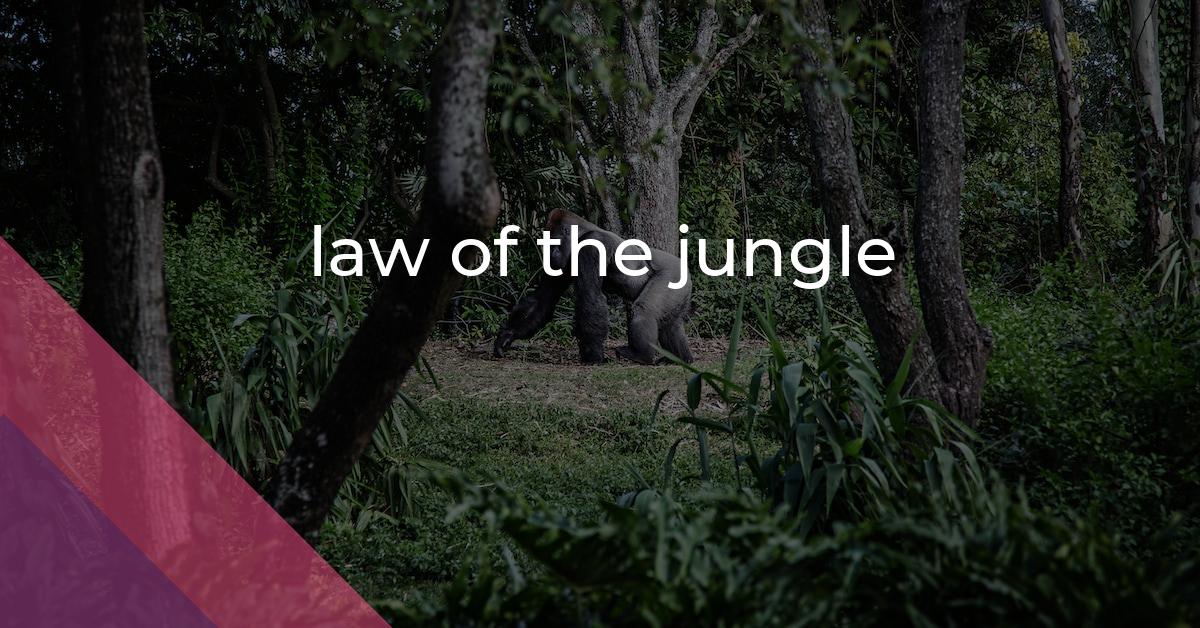law of the jungle: Idiom Meaning and Origin
What does ‘law of the jungle’ mean?
The idiom "law of the jungle" refers to a situation where people act in a selfish, ruthless, and survival-oriented manner, with no regard for moral or ethical principles. It implies a chaotic and competitive environment where only the strongest and most cunning individuals succeed.

Idiom Explorer
The idiom "let nature take its course" means to allow events to unfold naturally without interference or intervention, accepting the outcome as it occurs.
The idiom "lady or tiger" refers to a situation where there are two equally probable outcomes, one favorable and the other unfavorable, resembling two doors. The outcome can be unpredictable or dependent on unknown factors.
The idiom "king of beasts" refers to the lion, the most dominant and powerful animal in the animal kingdom. It symbolizes strength, leadership, and courage.
The idiom "killer instinct" refers to someone's strong and ruthless determination to succeed at all costs, often used to describe individuals who are highly competitive and willing to do whatever it takes to achieve their goals.
The idiom "just deserts" means to receive the appropriate punishment or reward for one's actions.
The idiom "junkyard dog" refers to someone who is fiercely protective and aggressive in defending their territory or interests. It conveys the idea of toughness and tenacity, often used to describe individuals who are always ready to fight back or stand up for themselves.
The idiom "judge, jury, and executioner" refers to a person who takes on multiple roles in a situation, unilaterally making decisions and carrying out their own form of justice without any oversight or input from others.
Having the tiger by the tail means being in a dangerous situation where one has a strong grip on something powerful and uncontrollable.
The idiom "have the law of someone" means to have legal or authoritative power over someone, often used to refer to a situation where someone is subject to the rules, regulations, or authority of another person or entity.
This idiom means to adapt to a situation or circumstance without resisting or trying to control it. It implies going along with whatever is happening and not trying to change or fight against it.
Navigating the Wild
The idiom "law of the jungle" has various interpretations and origins, making it an intriguing phrase to explore. This analysis aims to delve into the meaning of the idiom for a US audience, focusing solely on this specific idiom and its unique characteristics.
The idiom "law of the jungle" embodies the concept of survival instincts in the natural world and its implications for human behavior. It suggests that in nature, only the strongest and fittest individuals or groups will thrive while the weaker ones will perish. This dynamic can also be seen in human societies, where a similar "law of the jungle" applies.
The phrase originates from Rudyard Kipling's 1894 collection of stories titled "The Jungle Book." In this literary work, Kipling used the term "law of the jungle" to describe the rules and principles that govern the animal kingdom. The "law of the jungle" emphasizes the harshness and competitiveness of the natural world, where animals must constantly fight for survival and dominance.
While Kipling popularized the phrase in the context of animals, its usage expanded to include human societies. The idiom gained momentum and evolved to connote a cutthroat environment, where only the strongest and most ruthless individuals can succeed, often at the expense of others.
One related idiom is "killer instinct." This phrase refers to a ruthless and aggressive mentality, often associated with the "law of the jungle." Having a "killer instinct" means being willing to do whatever it takes to succeed, even if it means overpowering or eliminating others. This mindset is similar to the survival instinct seen in the natural world.
The idiom "feeding frenzy" is another term related to the "law of the jungle." It describes a situation where there is intense competition for limited resources, resulting in a chaotic and aggressive pursuit of those resources. This frenzy, reminiscent of the feeding habits of predators in the animal kingdom, demonstrates the ruthless nature of the "law of the jungle."
These idioms highlight the intense competition and lack of regulation that can exist in various sectors, such as business, politics, and even sports. They emphasize the "survival of the fittest" mentality, where individuals must rely on their strength, cunning, and adaptability to come out on top.
However, it is essential to note that the interpretation of the "law of the jungle" can vary depending on the context in which it is used. While some may view it as endorsing ruthless behavior, others may employ it to criticize the absence of fairness or moral guidelines in certain situations.
The idiom can also be used to highlight the importance of resilience, adaptability, and self-reliance in navigating challenging circumstances. It underscores the need to be proactive, assertive, and resourceful, echoing the principles associated with survival in the natural world.
The idiom "law of the jungle" encompasses the idea that in both the natural and human worlds, the survival instinct prevails. The phrase, initially derived from Rudyard Kipling's "The Jungle Book," has persisted through its evocative portrayal of the competitive nature of life. While its interpretation can vary, it ultimately conveys the concept that strength and adaptability are paramount when facing adversity.
As we reflect on this idiom, it reminds us of the intricate interplay between individuals, societies, and the rules that govern them. It prompts us to contemplate the complexities of human nature and our place in the world. The "law of the jungle," along with related idioms like "killer instinct" and "feeding frenzy," provides us with insights into the dynamics of competition and survival, encouraging us to navigate our own paths with resilience, adaptability, and the determination to succeed.
Example usage
Examples of how the idiom *law of the jungle* can be used in a sentence:
- The new CEO wants to implement the law of the jungle in the company, encouraging fierce competition and ridding the organization of any weak employees.
- In the overcrowded city, it often feels like it's the law of the jungle on the streets, with everyone fighting for themselves in traffic.
- The reality TV show portrays contestants battling each other for survival, showcasing the law of the jungle in action.
More "Survival" idioms



